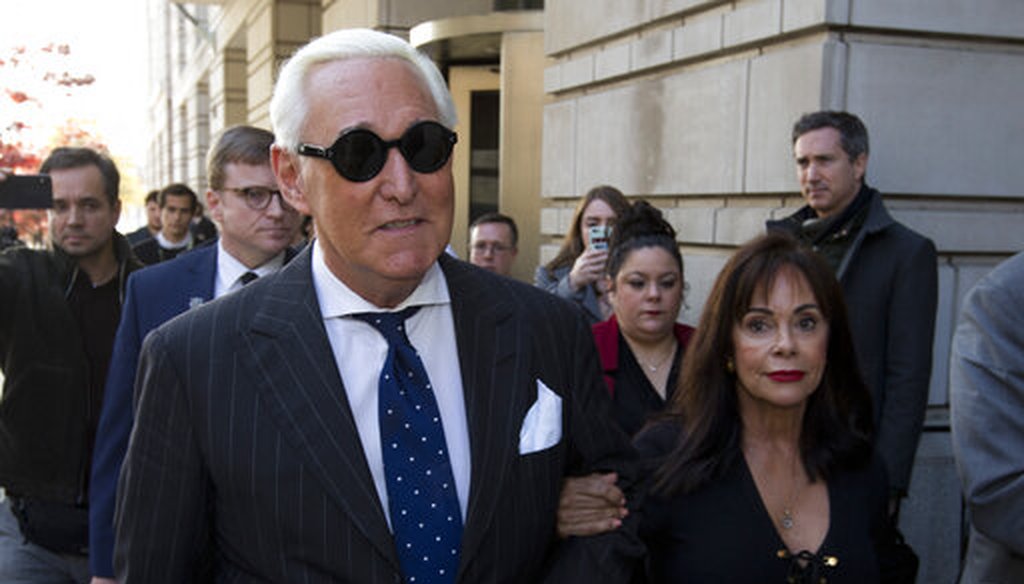Stand up for the facts!
Our only agenda is to publish the truth so you can be an informed participant in democracy.
We need your help.
I would like to contribute

Roger Stone, left, with his wife Nydia Stone, leaves federal court in Washington on Nov. 15, 2019, after being found guilty at his trial. (AP/Magana)
If Your Time is short
-
Four prosecutors withdrew from Roger Stone’s case after the Justice Department intervened to scale back the sentence they had recommended.
-
The prosecutors were not “exposed” in the sense that they were hiding something, despite Trump's claim. All four signed the public court filing making the original sentencing recommendation.
-
The prosecutors’ recommendation was within federal sentencing guidelines.
President Donald Trump has been tweeting zealously about the trial of longtime friend Roger Stone, who was convicted of several charges and is scheduled for sentencing Feb. 20.
The president has condemned Stone’s situation, called for a new trial, accused a juror of bias, blasted the judge on the case and praised Attorney General William Barr for his handling of it.
He has also attacked the four prosecutors who withdrew from the case after the Justice Department stepped in to scale back the seven-to-nine-year sentence they recommended.
"Who are the four prosecutors (Mueller people?) who cut and ran after being exposed for recommending a ridiculous 9 year prison sentence to a man that got caught up in an investigation that was illegal, the Mueller Scam, and shouldn’t ever even have started?" Trump wrote Feb. 11.
Who are the four prosecutors (Mueller people?) who cut and ran after being exposed for recommending a ridiculous 9 year prison sentence to a man that got caught up in an investigation that was illegal, the Mueller Scam, and shouldn’t ever even have started? 13 Angry Democrats?
— Donald J. Trump (@realDonaldTrump) February 12, 2020
The tweet muddles many facts. The Justice Department’s inspector general concluded that the Russia probe led by former special counsel Robert Mueller was justified, and two of the four lawyers who quit the Stone case were on Mueller’s team.
Additionally, the prosecutors were not "exposed" in the sense that they were caught red-handed or hiding something, since they filed their sentencing recommendation in a public court memo.
And while Trump may think the sentencing recommendation was "ridiculous," it fell within the federal sentencing guidelines for Stone’s offense.
The White House did not respond to a request for comment.
What you need to know about Stone’s case
Stone was convicted in November for witness tampering, lying to Congress and obstructing a congressional investigation after a jury found him guilty of seven counts related to his 2017 House testimony and efforts to access hacked Democratic emails ahead of the 2016 election.
On Feb. 10, the Justice Department’s prosecutors filed a sentencing memo in court recommending that Stone serve a prison term lasting between 87 and 108 months, or 7.25 and 9 years. Trump sounded off on Twitter, calling the recommendation "disgraceful" and a "miscarriage of justice."
This is a horrible and very unfair situation. The real crimes were on the other side, as nothing happens to them. Cannot allow this miscarriage of justice! https://t.co/rHPfYX6Vbv
— Donald J. Trump (@realDonaldTrump) February 11, 2020
On Feb. 11, a senior Justice Department official told reporters the department was "shocked" by the recommendation and found it "extreme and excessive and grossly disproportionate to Stone's offenses."
In a rare move, the department submitted a new memo undercutting the original recommendation and asking the court to sentence Stone to a shorter, unspecified term in prison.
RELATED: Can the president intervene in a federal criminal case?
The development spurred concerns that Barr was letting Trump guide his decision-making, which Barr and the Justice Department have denied. Thousands of former Justice Department attorneys signed a letter calling for Barr to resign.
Prosecutors’ actions were not taken in secret
In the aftermath of the Justice Department’s intervention, four career prosecutors on Stone’s case — Aaron Zelinsky, Jonathan Kravis, Adam Jed and Michael Marando — filed notices to withdraw from it. Kravis resigned from the Justice Department entirely.
We were unable to reach Kravis and Jed, and Zelinsky and Marando declined to comment.
Regardless of their motivations for withdrawing, it’s misleading for Trump to say they "cut and ran" and were "exposed" for proposing a seven-to-nine-year sentence for Stone.
There was nothing secret about their sentencing request, which was submitted in a public court filing that all four attorneys signed.
Sentencing recommendation was within guidelines
Trump called the recommended prison sentence "ridiculous," and other conservative commentators have said the seven-to-nine-year penalty is more fitting of a violent offender.
But legal experts told us that federal prosecutors often recommend sentences for nonviolent criminals that are within federal sentencing guidelines but may seem extreme to outsiders.
"There are thousands of cases where the recommended sentencing range under the guidelines would produce a sentence that most reasonable people would think is excessively long, but DOJ routinely asks for those guidelines sentences to be imposed," said Rachel Barkow, professor of law and policy at New York University Law.
When a person is sentenced in federal court, two factors come into play: The punishment allowed under the law in question, and the U.S. Sentencing Commission’s Federal Sentencing Guidelines. Judges ultimately decide which punishments to hand down.
The maximum and minimum punishments written into any law are binding, but since 2005, the federal sentencing guidelines have been considered advisory, rather than mandatory.
The Supreme Court ruled at that time that federal district courts, "while not bound to apply the guidelines, must consult those guidelines and take them into account when sentencing."
In Stone’s case, obstruction of a congressional investigation and lying to Congress each provide for prison sentences of up to five years, while witness tampering provides for up to 20 years. Stone had no criminal history and decided to proceed with a trial rather than plead guilty.
Following the federal sentencing guidelines, which use a point system to calculate an offense level and the corresponding sentencing range, the prosecutors in Stone’s case calculated that the longtime Trump ally deserved 87 to 108 months in jail.
That recommendation relied on several "enhancements" that elevated Stone’s punishment above the base level for his offenses because of the flagrant way in which he committed his crimes. Specifically, Stone threatened a witness’s life and dog, posted a photo of the judge with crosshairs beside her head, and repeatedly defied judges’ orders.
Stone’s defense argued against the threat-related enhancement because the witness testified that he didn’t take Stone’s threats seriously. Prosecutors rebutted that "it is the threat itself, not the likelihood of carrying out the threat, that triggers the enhancement."
Legal experts said the prosecutors were not misguided in their original assessment. Stanford Law School professor Robert Weisberg told us the requested sentencing was "harsh but not ridiculous," and Georgetown Law professor Rosa Brooks said it was "entirely reasonable."
"The recommended sentence was consistent with the sentencing guidelines," Barkow said.
Even the Justice Department’s second memo overruling the initial sentencing request acknowledged that the original recommendation was "perhaps technically applicable."
"There were a couple of arguable aspects in the government’s calculation of the range in this case, but I don’t think anything so patently unreasonable as to qualify as ‘ridiculous,’" said Michael O’Hear, professor of law at Marquette University Law School and an expert in criminal procedure and sentencing.
Federal judges sentence below the guidelines range in nearly half of all cases, O’Hear said. But these lesser sentences typically occur when defendants plead guilty or are especially cooperative and helpful with the government’s other investigations.
"Since Stone did neither of these things, there was nothing extraordinary about the government’s initial request that Stone be sentenced within the guideline range," O’Hear said.
"If the Department of Justice now takes the position that sentences of 87-108 months are excessive in cases that do not involve serious violent crime, then the department will have to reconsider its recommendations in many more cases than just Stone’s," he added.
Our Sources
Donald J. Trump on Twitter, Feb. 11, 2020
United States Sentencing Commission, "An Overview of the Federal Sentencing Guidelines," accessed Feb. 18, 2020
United States Sentencing Commission, "Federal Sentencing: The Basics," November 2018
United States District Court for the District of Columbia, United States of America v. Roger J. Stone Jr., "Notice of Withdrawal," Feb. 11, 2020
United States District Court for the District of Columbia, United States of America v. Roger J. Stone Jr., "Notice of Withdrawal," Feb. 11, 2020
United States District Court for the District of Columbia, United States of America v. Roger J. Stone Jr., "Notice of Withdrawal," Feb. 11, 2020
United States District Court for the District of Columbia, United States of America v. Roger J. Stone Jr., "Notice of Withdrawal," Feb. 11, 2020
United States District Court for the District of Columbia, United States of America v. Roger J. Stone Jr., "Government’s Supplemental and Amended Sentencing Memorandum," Feb. 11, 2020
United States District Court for the District of Columbia, United States of America v. Roger J. Stone Jr., "Government’s Sentencing Memorandum," Feb. 10, 2020
United States Sentencing Commission, "2018 Annual Report and Sourcebook of Federal Sentencing Statistics," 2018
The Associated Press, "AP FACT CHECK: Trump’s exaggerations on Roger Stone sentence," Feb. 17, 2020
Medium, "DOJ Alumni Statement on the Events Surrounding the Sentencing of Roger Stone," Feb. 16, 2020
Factcheck.org, "Roger Stone’s Crimes," Feb. 14, 2020
CNN, "Fact-checking the false claims Trump made in defending Roger Stone," Feb. 13, 2020
ABC News, "Barr blasts Trump's tweets on Stone case: 'Impossible for me to do my job': ABC News Exclusive," Feb. 13, 2020
Yahoo News, "Former federal prosecutors describe the Roger Stone sentencing reversal as unprecedented," Feb. 12, 2020
Stanford Law School, "Stanford Law’s Robert Weisberg on Roger Stone Sentencing and Independence of the DOJ," Feb. 12, 2020
The Atlantic, "Did Donald Trump just get Roger Stone’s prison sentence reduced?" Feb. 12, 2020
The Wall Street Journal, "Prosecutors in Stone Case Are Justice Department Veterans," Feb. 12, 2020
The Washington Post, "Prosecutors quit amid escalating Justice Dept. fight over Roger Stone’s prison term," Feb. 11, 2020
The New York Times, "Prosecutors Quit Roger Stone Case After Justice Dept. Intervenes on Sentencing," Feb. 11, 2020
The New York Times, "These Are the Roger Stone Prosecutors Who Quit the Case," Feb. 11, 2020
The New York Times, "Prosecutors Recommend Roger Stone Receive Up to 9 Years in Prison," Feb. 10, 2020
PolitiFact, "Fact-checking Barr’s dispute of inspector general’s report on the FBI, Russia probe," Dec. 11, 2019
PolitiFact, "Fact-checking Donald Trump's claims about Democrats on Robert Mueller's team," March 21, 2018
PolitiFact, "Trump wrongly calls Mueller's staffers Clinton supporters, employees," June 26, 2017
Email interview with Rosa Brooks, professor of law and policy at Georgetown Law, Feb. 17, 2020
Email interview with Rachel Barkow, professor of regulatory law and policy and faculty director of the Center on the Administration of Criminal Law at New York University Law, Feb. 17, 2020
Email interview with Robert Weisberg, professor of law at Stanford Law School and faculty co-director at the Stanford Criminal Justice Center, Feb. 18, 2020
Email interview with Michael O’Hear, professor of law at Marquette University Law School, Feb. 18, 2020






























